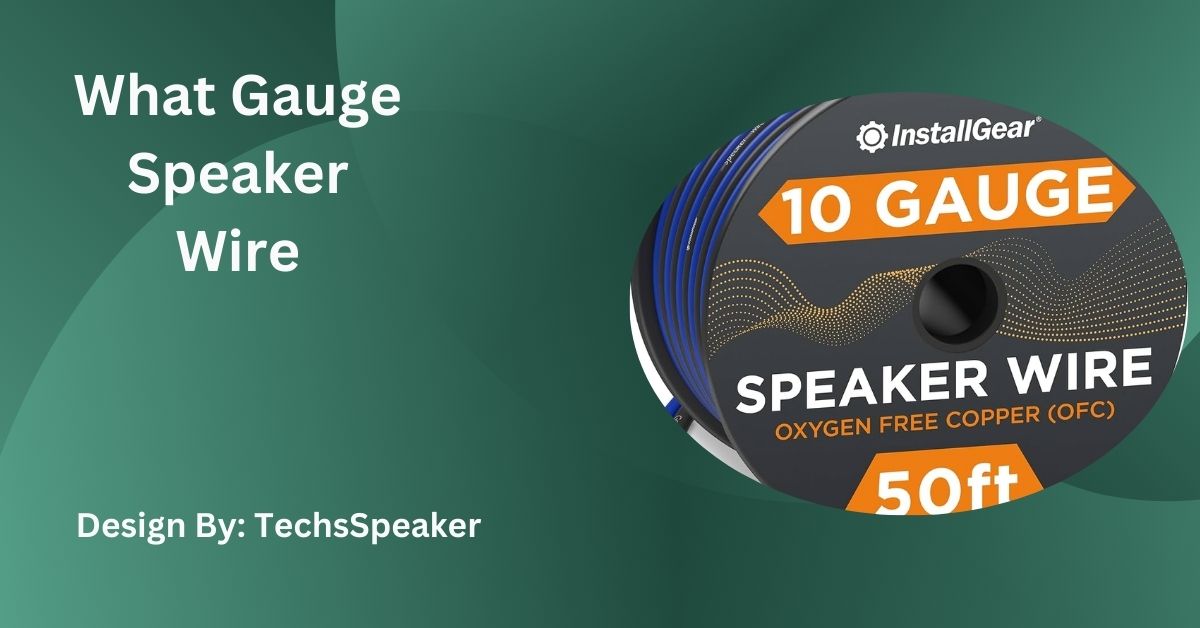The gauge of speaker wire affects sound quality and efficiency. Thicker wires (lower gauge) are better for long distances and high power, ensuring clear audio performance.
Introduction to Speaker Wire Gauge:
When setting up any audio system, whether it’s in your home, car, or a professional setting, one crucial aspect often overlooked is the speaker wire gauge. The term “gauge” refers to the thickness of the wire, which plays a significant role in how well your speakers perform.
Understanding the importance of speaker wire gauge ensures you get the best possible sound quality. In this guide, we’ll walk you through everything you need to know about choosing the right speaker wire for your needs.
Importance of Speaker Wire Gauge:
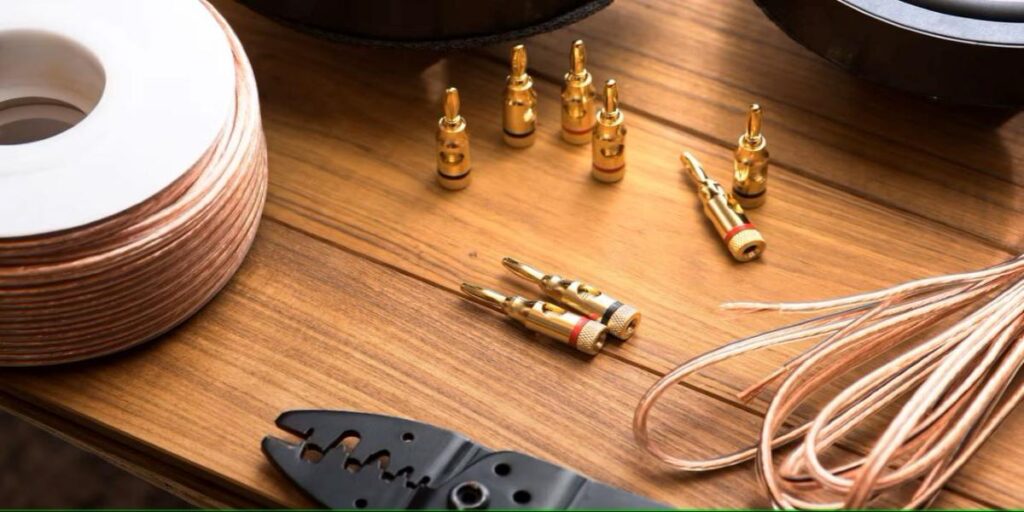
The gauge of a speaker wire is more than just a technical detail—it’s a key factor in determining how efficiently your audio system operates.
- Sound Quality: Thicker wires (lower gauge numbers) carry more current with less resistance, which means better sound quality. Thinner wires (higher gauge numbers) can lead to power loss, especially over long distances, resulting in weaker sound.
- Power Handling: Your audio system’s power also matters. If you’re pushing a lot of power through your speakers, thinner wires might not handle it well, leading to reduced performance or even damage over time.
- Efficiency: Efficient power transfer is critical for getting the most out of your speakers. The right wire gauge ensures that your speakers receive the full power they need, maintaining clarity and volume.
Also Read: High Efficiency Speaker Drivers – A Comprehensive Guide!
How to Choose the Right Gauge, Length, and Type?
Selecting the right speaker wire involves considering the following:
- Distance Matters: The length of the wire run from your amplifier or receiver to your speakers is crucial. The longer the distance, the thicker the wire should be to reduce resistance and maintain sound quality.
- Short Runs (under 50 feet): 16-gauge wire is usually sufficient.
- Medium Runs (50-100 feet): 14-gauge wire is recommended.
- Long Runs (over 100 feet): 12-gauge wire is ideal to minimize power loss.
- Power Requirements: If you have a high-power audio system, opt for thicker wire to ensure it can handle the wattage without overheating or degrading the sound.
- Speaker Impedance: The lower the impedance of your speakers (e.g., 4 ohms), the thicker the wire should be. This is because lower impedance speakers draw more current, and you need a wire that can handle that current without excessive resistance.
- Wire Type: The type of metal in the wire affects conductivity and durability.
- Oxygen-Free Copper (OFC): Offers superior conductivity and is less prone to corrosion, making it a popular choice for high-quality audio systems.
- Copper-Clad Aluminum (CCA): More affordable but less conductive and durable than OFC. It’s a budget-friendly option for non-critical applications.
- Silver-Plated Copper: Provides excellent conductivity and is typically used in professional or high-end audiophile systems, though it’s more expensive.
What Gauge Wire is Needed for Home Speakers?
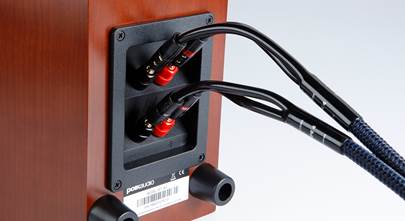
For most home audio systems, the choice of speaker wire gauge is straightforward:
- 16-Gauge: Ideal for short distances (up to 50 feet). It’s commonly used in home theaters and small to medium-sized rooms.
- 14-Gauge: Suitable for medium distances (50-100 feet). It provides a good balance between performance and flexibility.
- 12-Gauge: The best choice for long distances or high-power systems. It’s thicker and ensures that your speakers receive ample power with minimal loss.
Also Read: Technical Pro Bluetooth Speaker How To Connect – Complete Guide!
What Type of Speaker Wire Do You Need?
Choosing the right type of wire is as important as selecting the correct gauge. Here’s what you need to consider:
- Oxygen-Free Copper (OFC): The best option for most setups due to its excellent conductivity and resistance to corrosion. OFC wires are durable and offer clear, high-quality sound.
- Copper-Clad Aluminum (CCA): A more affordable option. It’s less conductive than OFC and more prone to corrosion but is sufficient for budget systems or non-critical applications.
- Silver-Plated Copper: This type is highly conductive and ideal for professional audio systems or audiophiles. It’s more expensive, so it’s usually reserved for high-end setups.
- 12-Gauge Wire:
- High Power Handling: Ideal for long runs and high-power systems.
- Low Resistance: Better signal transmission, less signal loss.
- Durability: Thicker wire, less prone to damage.
- 14-Gauge Wire:
- Medium Power Systems: Suitable for most home audio setups.
- Versatility: Works well for moderate distances and power levels.
- Flexibility: Easier to handle and install compared to 12-gauge.
- 16-Gauge Wire:
- Short Runs: Perfect for shorter distances (under 50 feet).
- Low to Moderate Power: Adequate for bookshelf speakers and smaller systems.
- Cost-Effective: Cheaper and still provides good performance.
- 18-Gauge Wire:
- Compact Systems: Best for small, low-power speakers.
- Shortest Runs: Suitable for very short distances (under 25 feet).
- Budget-Friendly: Most affordable, but limited in performance for higher power needs.
These points highlight the best use cases for different wire gauges, helping you choose the right one for your speaker setup.
How to Connect Speaker Wire?
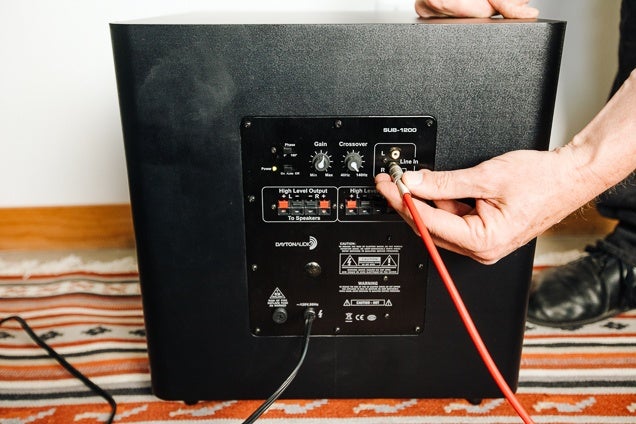
Connecting your speaker wire correctly is vital for ensuring good sound quality. Here’s a simple guide:
- Strip the Wire: Use a wire stripper to remove about half an inch of the insulation from each end of the wire.
- Twist the Strands: After stripping, twist the exposed strands tightly to prevent fraying. This ensures a solid connection.
- Connect to Terminals: Insert the twisted wire into the appropriate terminals on your speakers and amplifier or receiver. Make sure the positive (red) and negative (black) wires are connected to the corresponding terminals.
- Secure the Connection: Ensure that the connection is tight and secure to prevent any loose connections, which can cause poor sound quality or signal loss.
Most Common Speaker Wire Gauge:
The most commonly used speaker wire gauges are:
- 16-Gauge: The most versatile and widely used gauge, ideal for most home audio applications.
- 14-Gauge: A step up from 16-gauge, suitable for longer runs and higher power setups.
- 12-Gauge: The thickest common gauge, used for long runs and high-powered systems where maximum current transfer is needed.
Also Read: How Much Does It Cost To Fix A Blown Speaker – A Detailed Guide!
What Gauge Speaker Wire for 100 Watts?
For speakers that require 100 watts of power, the speaker wire gauge should be chosen based on the distance the wire needs to run.
- For distances up to 25 feet: A 16-gauge wire will suffice, as it can handle the power requirements without significant loss.
- For distances between 25 and 50 feet: A 14-gauge wire is recommended to ensure the signal strength remains strong over the length.
- For distances over 50 feet: A 12-gauge wire should be used to prevent signal degradation and ensure that the full 100 watts of power reaches the speakers.
How Many Watts Can 16 Gauge Speaker Wire Handle?
A 16-gauge speaker wire can typically handle up to 75 watts over a distance of up to 50 feet. It’s suitable for most home audio systems, ensuring good sound quality without significant signal loss or overheating.
What Gauge Speaker Wire to Use?
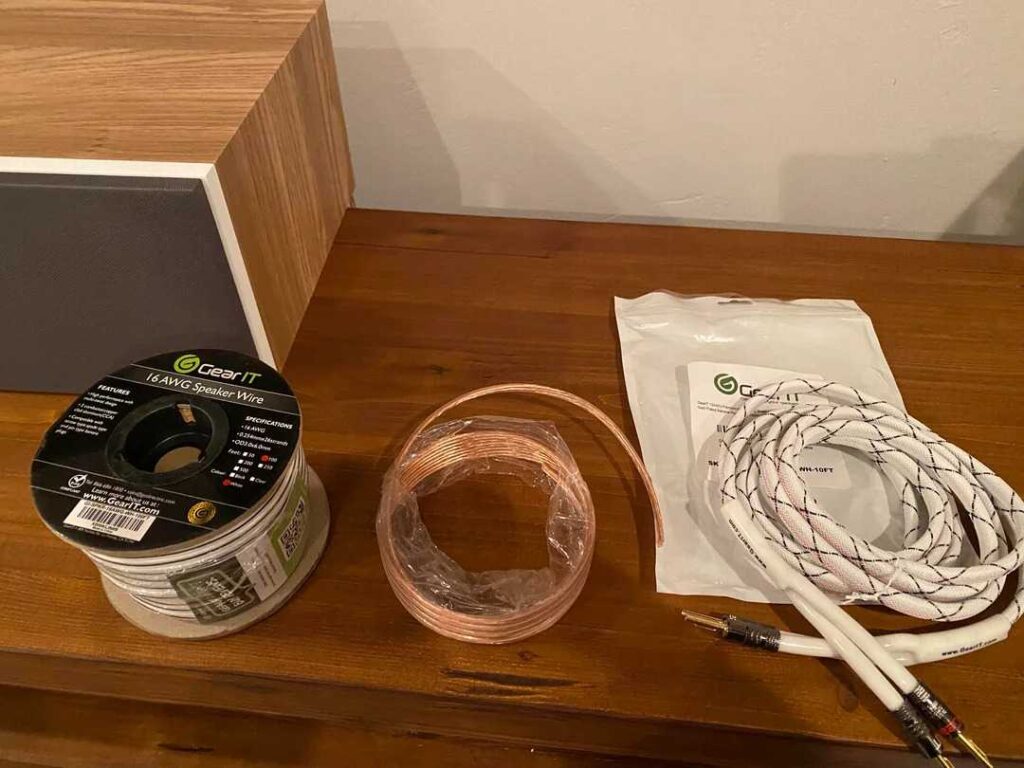
Choosing the correct speaker wire gauge depends on the power requirements of your speakers and the distance between the speakers and the amplifier or receiver.
- General recommendations:
- 16-gauge wire for most speakers in average-sized rooms.
- 14-gauge wire for higher power systems or longer distances.
- 12-gauge wire for very long distances or when maximum power is needed.
- Matching wire gauge with speaker impedance: If you have speakers with a lower impedance (4 ohms), you might need thicker wire, such as 12- or 14-gauge, to handle the increased current.
What Gauge Speaker Wire for Subwoofer?
When setting up a subwoofer, the right speaker wire gauge is crucial to ensure optimal performance. The gauge of a wire refers to its thickness, which impacts how efficiently it transmits electrical signals. For subwoofers, where power requirements are typically higher, choosing the correct gauge is essential.
- For short distances (up to 25 feet): A 16-gauge wire is sufficient for most subwoofers. It’s thick enough to carry the power without significant signal loss.
- For longer distances (25-50 feet): Use a 14-gauge wire. This thicker wire ensures that the signal remains strong over the extended length, preventing any degradation in audio quality.
- For very long distances (over 50 feet): A 12-gauge wire is recommended. This is the thickest common speaker wire and provides the least resistance, making it ideal for long runs.
FAQ’s:
1. What gauge speaker wire is best for home use?
For most home audio setups, 16-gauge wire is adequate for short runs, while 14-gauge is better for medium distances and 12-gauge is ideal for long runs or high-power systems.
2. How can I calculate the required speaker wire length?
Measure the distance from your amplifier to each speaker and add extra length for flexibility and adjustments.
3. What type of wire should I use for optimal sound quality?
Oxygen-Free Copper (OFC) is recommended for its superior conductivity and durability, ensuring high-quality sound.
4. How do I connect speaker wires to my system?
Strip the wire ends, twist the strands, and securely connect them to the appropriate terminals on your speakers and amplifier.
5. What’s the difference between OFC and CCA speaker wire?
Oxygen-Free Copper (OFC) offers better conductivity and durability compared to Copper-Clad Aluminum (CCA), which is less conductive and more prone to corrosion.
Conclusion:
Selecting the right speaker wire gauge is crucial for achieving the best audio quality. Thicker wires handle longer distances and higher power better, ensuring clear and efficient sound. For most setups, 16-gauge or 14-gauge wire is sufficient, while 12-gauge is ideal for demanding applications. By choosing the correct gauge and type, you enhance your audio experience and maintain optimal system performance.

